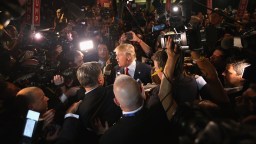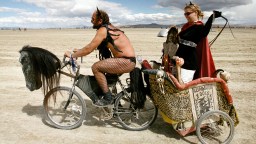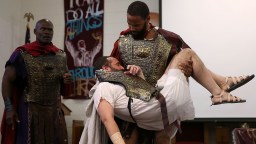The Present
All Stories
One in five employees are distracted at work by social media, a Pew Research Center poll finds.
Spain and the US have very similar compulsory school hours and homework requirements. There’s a good argument for rallying against this trend.
In between time checks on the Doomsday Clock, Stephen Hawking is here to remind us we are living in dangerous times.
How should we view the amendment to Rule 41? Edward Snowden would have you believe it returns us to a time when a tyrant ruled over America.
Harvard University offers a free course on Buddhist scriptures.
Jon Stewart shares his thoughts on many issues during a recent talk with the New York Times.
It turns out there’s quite a bit of cognitive dissonance impairing our understanding of motivation and happiness. Duke University’s Professor Dan Ariely fills in the gaps.
▸
8 min
—
with
Poor Americans, people in rural locations, and those with disabilities would benefit most.
Slavoj Žižek examines the situation out of which refugees are created, and criticizes conservatives and liberals alike for their “conspiracy theories”.
▸
23 min
—
with
“We love, as a culture, to attack messengers when the message is something that makes us feel uncomfortable,” says journalist Wesley Lowery.
▸
3 min
—
with
Millions of Muslims marched to Karbala, Iraq even after suicide bombing and continued threats by ISIL. The Arbaeen pilgrimage continues to be a show of religious freedom.
As the US prepares for a change in power, Professor Sanford Levinson says dialogue that was formerly bound to people’s inner monologue has been “liberated” into the public space.
A new site offers a way to delete most of your Internet accounts in one go.
Why do people believe fake news? It’s not because it gets shared all over Facebook; it’s because they don’t trust mainstream news. And Snopes agrees with them.
Elon Musk has a plan and part of that plan came together when it acquired SolarCity for $2.6 billion.
Don’t believe everything Google tells you. Facebook and Google are taking measures against fake news, but it’s becoming clear that it’s a symptom of a bigger problem.
Journalist Jelani Cobb considers the impact of Obama’s presidency on race in America. Did he make good on the promise of change that got him elected?
▸
6 min
—
with
NSA whistleblower Edward Snowden told an audience we should not be “putting too much faith or fear elected officials.” This includes Donald Trump.
Canada puts its money where its mouth is and prepares for a ‘no strings attached’ basic income trial that it hopes will break the cycle of poverty.
Slovenian philosopher Slavoj Žižek thinks the U.S. political machinery is truly broken. He guides a verbal tour through the failure of manufactured consent, the appeal of human baseness, and politics as a real struggle of life and death.
▸
8 min
—
with
What if you found out your disaster relief donation did more harm than good? Juanita Rilling explains the humanitarian logistics of unwanted donations, and how you can give in a more informed way.
▸
5 min
—
with
Bitcoin will bring a seismic shift in global finance, says Toni Lane Casserly: “If you are an institution with integrity, generally I would say you don’t have anything to worry about.” … So long to the world as we know it.
▸
10 min
—
with
A recent study has found “significant evidence of racial discrimination” in ride-hailing services Uber and Lyft. If you’re black, you may be more likely to find your ride canceled or be subjected to longer wait times.
Election day is near and photos of people casting their ballots have already started to flow onto social media. But, depending on what state you live in, that voting selfie might be illegal
History’s most powerful female leaders, ranked.
The polls are in, and what will be the deciding factor in the 2016 U.S. Presidential election is something a little more human.
If Donald Trump’s political strategies look familiar, says Tim Wu, it’s because we’ve seen them before. Where? In the totalitarian regimes of China, North Korea, and Germany.
▸
3 min
—
with
What happens when Shakespeare goes to prison? His works humanize prisoners and open them up to reform in a way that the prison system fails to, says author Margaret Atwood.
▸
8 min
—
with
Driverless cars are nothing short of a revolution – not a technological revolution, but a social one, that will determine how fast we can accept, adapt and trust these new systems to change our lives.
Driverless cars may be borne out of science fiction, but they are fast becoming realities on tomorrow’s roadways. The transition from driver to robot is nothing short of a revolution. Not a technological revolution, but a social one, that will determine how fast we can accept, adapt and trust these new systems to change how and where we live, work, play and interact with each other.
The future success or failure of the economy is up to the young, and many countries could do better to equip them.





























